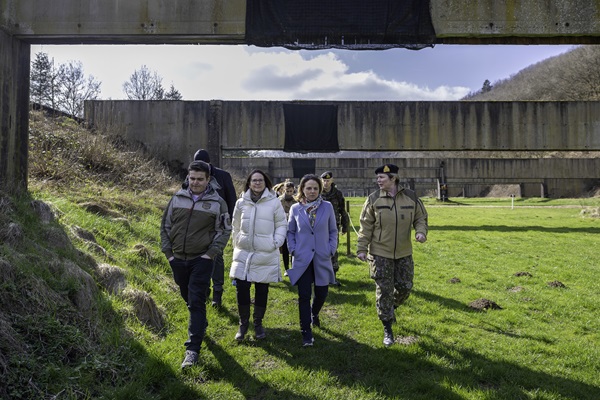 Credit: Luxembourg Army
Credit: Luxembourg Army
On Thursday 7 March 2024, the Minister for Defence, Minister for Mobility and Public Works, Yuriko Backes, together with members of the parliamentary committees for Defence, Mobility and Public Works, and Luxembourg’s Chief of Defence, General Steve Thull, visited the firing range at Bleesdall and the military camp at Waldhof.
This visit, organised at the initiative of Yuriko Backes, follows the minister's presentation of the two bills to redevelop the infrastructure at Bleesdall and Waldhof to the Committee on Mobility and Public Works on 18 January 2024, Luxembourg's Directorate of Defence and the Ministry of Mobility and Public Works noted.
The buildings on both military sites date back to the 1950s, and no major renovation work has been carried out since then. Therefore, redevelopment work was necessary to bring them into line with legal requirements for health and safety at work, NATO standards for ammunition storage management, and to keep pace with developments in shooting techniques within the armed forces. The costs of the two redevelopment projects amount to €71.5 million for the shooting range at Bleesdall and €81.5 million for the military camp at Waldhof. These costs are part of the general efforts to modernise the army and military infrastructure in Luxembourg, Luxembourg's Directorate of Defence added.
Together with the project to redevelop and extend the Grand Duke Jean barracks at Herrenberg in Diekirch, these projects aim to provide lasting support for the Luxembourg Army and meet its functional needs. According to Luxembourg’s Directorate of Defence, the profoundly altered geopolitical context, particularly marked by the war in Ukraine, underscores the importance for the Luxembourg Army to have modern and adequate infrastructures, to create the necessary conditions for training, guarantee better working conditions for its personnel, and mitigate its environmental impact. The project is also in line with the government's commitment to increase the defence effort to 2% of gross national income (GNI) in the medium term, the implementation of the bi-national reconnaissance battalion by 2030, and the increase in personnel requirements that accompany these ambitions.








